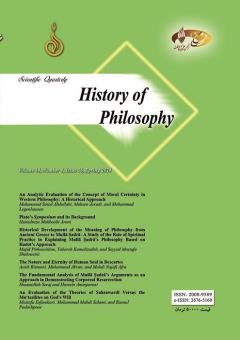An Evaluation of the Theories of Suhrawardī Versus the Mu‘tazilites on God’s Will
Subject Areas : Geneology of philosophical schools and Ideas
Mostafa Esfandiari
1
,
Mohammad Mahdi Salami
2
,
Rasool Padashpour
3
*
![]()
1 - Assistant Professor, Razavi University of Mashhad, Mashhad, Iran
2 - PhD candidate, Razavi University of Mashhad, Mashhad, Iran
3 - Lecturer and Researcher at Khorasan Seminary, Mashhad, Iran
Keywords: God’s Will, Suhrawardī, light of all lights, Mu‘tazilites, addition of attributes to essence,
Abstract :
One of the attributes and perfections of God is Will, a correct perception of which, similar to other attributes, can lead to the perfection of the knower. Although all Muslim phosphors attribute this Will to God, the quality of this attribution has always created some clash of ideas. Most Mu‘tazilite mutikallimūn negate God’s affirmative attributes, including will, to essence and consider them to be additional to it. They maintain that the Divine Essence is the vicegerent for attributes. Among pre-Suhrawardī philosophers, some interpret the free will as the knowledge of the higher order, and some others have referred it to the attribute of knowledge to clarify its meaning. As a result, these two attributes are in unity with each other in terms of concept and referents. Regarding Suhrawardī, some believe that he denies the free will, while a study of the fundamental principles of his philosophical system reveals that the opposite holds true. From among such principles, reference can be made to the gracefulness of the light of all lights (nūr al-anwār), identity of Divine Attributes with Essence, and the light of all lights as the sum of all perfections. According to these principles, all the perfections at lower levels exist in the highest level in a more complete and nobler form. The attribute of will is also an existential perfection, the demonstration of which leads to honor and eminence, and the denial of which leads to the negation of perfection. Hence, given the general content of Shurawardī’s philosophy, he must have necessarily agreed with attributing will to Almighty God. Regarding the inclusiveness of will, the Mu‘tazilites do not view Man as possessing the necessary will, while Suhrawardī considers the attributes of the light of all lights to belong to all existents, including Man in the light of introducing the light of all lights as an all-inclusive truth.
قرآنکریم.
نهج البلاغه (1388) ترجمۀ محمد دشتی. تهران: مؤسسۀ امیرالمؤمنین(ع).
ابنسینا، حسینبن عبدالله (1371) المباحثات، تصحیح محسن بیدارفر، قم: بیدار.
ابنسینا، حسینبن عبدالله (1376) الالهیات من کتاب الشفاء، تصحیح حسن حسن زاده آملی، قم: دفتر تبلیغات اسلامی.
ابنسینا، حسینبن عبدالله (1383) دانشنامه علائی، تصحیح محمد معین، همدان، دانشگاه بوعلیسینا.
ابنسینا، حسینبن عبدالله (1404ق) التعلیقات، تصحیح عبدالرحمن بدوی، قم: مکتب الاعلام الاسلامی.
اسفراینی، شهقوربن طاهر (1999م) التبصیر فىالدین، قاهره: المکتبة الأزهریة للتراث.
بحرینی، میثمبن علی (1406ق) قواعد المرام فی علم الکلام، قم: کتابخانه آیتالله مرعشی نجفی.
بدوی، عبدالرحمن (1389) تاریخ اندیشههای كلامی در اسلام، ترجمۀ حسین صابری، مشهد: بنیاد پژوهشهای آستان قدس رضوی.
برنجکار، رضا (1375) «مفوضه چه کسانی هستند؟»، معرفت، شمارۀ ١٦، ص61ـ٥٥.
تفتازانی، مسعودبن عمر (۱۴۱۲ق) شرح المقاصد، ج. قم: شریف رضی.
جوهری، اسماعیلبن حماد (1382) تاج اللغه، تحقیق عبدالسلام هارون، تهران: مؤسسه الصادق.
حلی، حسن بن یوسف؛ حلی، عبدالحلیم (۱۳۸۶) معارج الفهم فی شرح النظم، قم: دلیل ما.
حلی، حسنبن یوسف (۱۳۶۳) أنوار الملکوت فی شرح الیاقوت، قم: شریف رضی.
حلی، حسنبن یوسف (1382) کشف المراد فی شرح تجرید الإعتقاد، تصحیح جعفر سبحانی تبریزی، قم مؤسسة امام الصادق(ع).
حلی، حسنبن یوسف (1407ق) کشف المراد فی شرح تجرید الاعتقاد، قم: موسسۀ نشر اسلامی.
خمینی، سیدروحالله (۱۳۷۹) الطلب و الاراده، تهران: مؤسسه تنظیم و نشر آثار امام خمینی.
خواجگی شیرازی، محمدبن احمد (1375) النظامیة فی مذهب الامامیة، تهران: میراث مکتوب.
سبزواری، ملاهادی (1386) شرح المنظومه، تصحیح محسن بیدار فر، قم: بیدار.
سهروردی، شهابالدین یحیی (1316) یزدان شناخت، تصحیح تقوی، تهران: علمی.
سهروردی، شهابالدین یحیی (1372) مجموعه مصنفات شیخ اشراق، تصحیح هانری کربن، تهران: وزارت فرهنگ و آموزش عالی.
سهروردی، شهابالدین یحیی (1392) حکمةالاشراق بهمراه شرح قطبالدین رازی و تعلیقات صدرالمتألهین، ج3و4، تصحیح و تحقیق نجفقلی حبیبی، تهران: بنیاد حکمت اسلامی صدرا.
شهرستانی، محمدبن عبدالکریم (1362) ملل و نحل، ترجمۀ مصطفی خالقداد هاشمی، تهران: اقبال.
شیرازی، قطبالدین (1383) شرح ، بهاهتمام عبدالله نورانی و مهدی محقق، تهران: انجمن آثار و مفاخر فرهنگی.
طباطبایی، سیدمحمدحسین (1382) نهایة الحکمة، تصحیح زارعی سبزواری، قم: انتشارات اسلامی.
طباطبایی، سیدمحمدحسین (1388) بدایة الحکمة ، قم: جامعه مدرسین حوزه علمیه.
الطریحی، فخرالدین (1367) مجمع البحرین، تهران: دفتر نشر فرهنگ اسلامی.
طوسی، خواجه نصیرالدین (1379) شرح الاشارات، تهران: مؤسسه نصر.
طوسی، خواجه نصیرالدین (1383) اجوبة المسائل النصیریه، تهران: پژوهشگاه علوم انسانی و مطالعات فرهنگی.
طوسی، محمدبن حسن (۱۳۹۹) اندیشههای کلامی شیخ طوسی رحمة الله، مشهد: دانشگاه علوم اسلامی رضوی.
عبدالجبار معتزلی (1416ق) شرح الاصول الخمسة، تحقیق عبدالکریم عثمان، مصر: مکتبة وهبة.
عبدالجبار معتزلی (بیتا) المغنی فی أبواب التوحید و العدل، بیجا بینا.
غزالی، محمدبن محمد (1961م) مقاصد الفلاسفه، قاهره: دار المعارف.
فارابی، ابونصر (1988م) التعلیقات، بیروت: دار المناهل.
فخر رازی، محمد بن عمر (1414ق) القضاء و القدر، تصحیح محمد معتصم بالله بغدادی، بیروت: دار الکتاب العربی.
فیروزآبادی، محمدبن یعقوب (1404ق) القاموس المحیط، بیروت: دار الکتب العلمیه.
مجلسی، محمدباقر (1403ق) بحارالأنوار، بیروت: مؤسسة الوفاء.
مطهرى، مرتضی (1395) مجموعه آثار، تهران: صدرا.
مفید، محمدبن النعمان (بیتا) اوائل المقالات، قم: بینا.
ملاحمی، محمود (2010م) الفائق فی اصول الدین، تحقیق فیصل بدیرعون، قاهره، دارالکتب و الوثاق القومیة.
ملاصدرا (1397) الحکمة المتعالیة فی الأسفار الأربعة، ج6، تصحیح و تحقیق احمد احمدی، تهران: بنیاد حکمت اسلامی صدرا.
یزدانپناه، یدالله (1394) حکمت اشراق، قم: پژوهشگاه حوزه و دانشگاه.

